Choosing Therapy
Choosing Therapy
A Guide to Getting What You Need
Ilyana Romanovsky
ROWMAN & LITTLEFIELD
Lanham Boulder New York Toronto Plymouth, UK
Rowman & Littlefield
4501 Forbes Boulevard, Suite 200, Lanham, Maryland 20706
www.rowman.com
10 Thornbury Road, Plymouth PL6 7PP, United Kingdom
Copyright 2014 by Rowman & Littlefield
All rights reserved. No part of this book may be reproduced in any form or by any electronic or mechanical means, including information storage and retrieval systems, without written permission from the publisher, except by a reviewer who may quote passages in a review.
British Library Cataloguing in Publication Information Available
Library of Congress Cataloging-in-Publication Data
Romanovsky, Ilyana, 1982
Choosing therapy : a guide to getting what you need / Ilyana Romanovsky.
pages cm
Includes bibliographical references and index.
ISBN 978-1-4422-2543-5 (cloth : alk. paper)ISBN 978-1-4422-2544-2 (electronic)
1. Psychotherapy. 2. PsychotherapyEvaluation. 3. Psychotherapist and patient. I. Title.
RC480.R66 2013
616.89'14dc23
2013024915
 TM The paper used in this publication meets the minimum requirements of American National Standard for Information Sciences Permanence of Paper for Printed Library Materials, ANSI/NISO Z39.48-1992.
TM The paper used in this publication meets the minimum requirements of American National Standard for Information Sciences Permanence of Paper for Printed Library Materials, ANSI/NISO Z39.48-1992.
Printed in the United States of America
Acknowledgments
I am grateful to my close friends who have supported me through this process and facilitated my writing. I also owe a great debt to my patients who have graced some of the pages of this book. Most of the cases I describe are true stories, although I have made significant modifications and changes to protect the identity of those who were so gracious to allow me to share snippets of their treatment. Also, the dialogue was my writing, not actual transcripts, and names and genders were changed to protect confidentiality of each patients therapeutic experience.
In writing this book I also owe a great debt to my parents. Their enthusiasm, knowledge, wisdom, and most of all, emotional support helped me finish this project. They always know how to make me work while smiling.
Introduction
Try not. Do or do not. There is no try.
Yoda
So you decided to give therapy a try. After many hours, weeks, or perhaps months of agonizing over whether therapy is the answer to your problem, you find yourself searching online for the best-rated shrink. Is this guy experienced enough? Will my problems get resolved? How am I going to be able to pay for it? Can I even get through the hour with a perfect stranger? This recognizable inner, scared voice in all of us assumes you are doing the right thing and simultaneously questions everything in the process.
Like any decision we make in life, beginning therapy involves mastering a large body of knowledge, navigating the thousands of therapists in the field and finding the right one, understanding different theoretical orientations, learning a variety of skills on how to be in therapy, and exploring ones innermost self with a complete stranger. The complexity of this journey is inadequately addressed in most books, if at all. Some folks are unfortunately stuck navigating this difficult process on their own, and leaving many decisions to chance. In this book, I address the experience of finding the right therapist and giving you the tools necessary to understand how aspects of different theoretical formulations affect the type of therapy that you receive. In the following chapters, I provide the knowledge to find the right therapist and introduce you to a new way of thinking through the process of therapy.
Over the years, many friends and family members, who wanted to begin therapy for various issues, asked the one question I heard most: Who can I go and see for this issue? For most people, the primary initial challenge of psychotherapy is understanding which type of therapy or therapist is better for a particular problem. Unlike any other field, psychology is something many people are interested in studying, and psychotherapy appeals to many, yet few divulge their personal experiences with therapy. Unfortunately, this defense handicaps people from hearing the necessary information on how to choose a good therapist and learning which particular therapeutic skills are best for intervening with specific problems. Regardless of therapeutic formulations and skill sets that therapists use in their practice, therapy itself is a very interpersonal experience between a therapist and a patient. There is no one-size-fits-all therapist and no average client. Learning how to give therapy is an art form, much like knowing how to receive it. The innermost, private world of a therapist is the most important guiding tool that therapists use when conducting sessions. Based on this aspect alone, it is possible to select a right therapist; however, like with anything else, it is also valuable to choose a therapist based on other professional skills, objectives, experience, and theoretical background. In this book I explore the experience of selecting the right therapist for you and if nothing else, make the entire journey of therapy understandable and easywhile keeping in mind the ultimate result of getting the most bang for your buck in personal psychotherapy.
Part I
Walking through the Door
Chapter 1
Psychotherapy Explained
He who has a why to live can bear almost any how.
Friedrich Nietzsche
You decide to start therapy and you ask yourself, How am I going to do this? It is a common question to ask on the path of choosing the right therapist. But first thing first. To choose correctly, you have to know a little bit about the efficacy of psychotherapy, the importance of outcomes-informed care, and the different theoretical models therapists use when counseling patients. Lets start from the beginning.
Medicine and healing practices have existed since the origin of the human species and yet only recently did scientists question the efficacy of certain scientific disciplines. The one discipline that has received a great deal of scrutiny over the years is psychotherapy. Even as early as the 1950s, research claimed that certain therapeutic practices were not only unhelpful, but harmful to humans. About two decades later these original claims were disputed and showed that psychotherapy is effective as compared to the no-treatment control groups. Therefore, to address the first question of Is psychotherapy effective?the answer is a resounding yes. Now, what does this mean for you, a person thinking about beginning therapy? Well, for starters, giving yourself permission to trust in the process of therapy is a first step toward receiving positive benefits from therapy. After all, despite being willing to spend the money on therapy, questioning the efficacy of therapy could be a significant initial barrier toward progress.
When it comes to medicine, some treatments are clearly more effective than others. Looking through the latest research, you can quickly surmise that certain studies have better outcomes than others. It is easy to check the latest popular literature, scientific journals, or newspapers and discover which treatment is more effective for a specific ailment. What about psychotherapy? The next question many ask is: Are some therapies more effective than others? and if so, then how do I find a therapist that will deliver a therapy that is most effective for my particular problem?
Several years of research, including but not limited to many meta-analytical studies, concluded that generically, all treatments are about equally effective when delivered by therapists who believe in the treatment they are providing. There is, however, value in understanding the different types of treatment approaches. This reason has mainly to do with the type of therapy you would want to receive. This comes into play when considering long-term versus short-term psychotherapy, evidence-based versus nonevidence-based practices, and past versus present or future orientations. The therapist determines which key ingredients for successful treatment are delivered, as long as the therapy the therapist uses contains those specific ingredients.
Next page

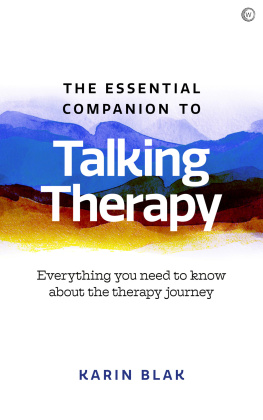
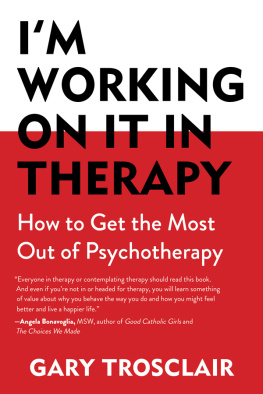
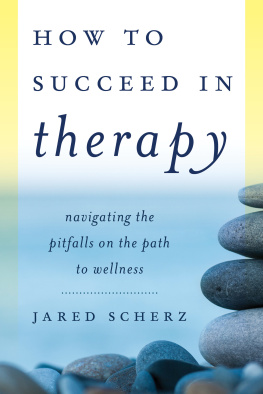
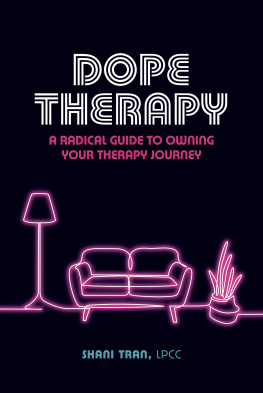
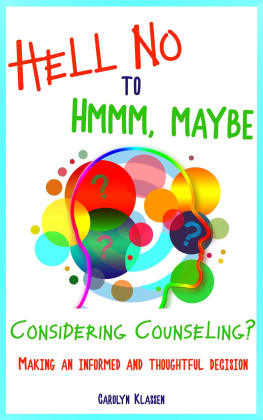
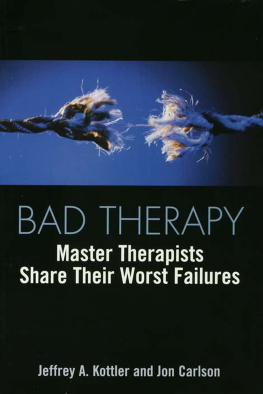
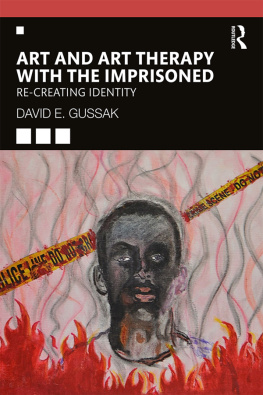
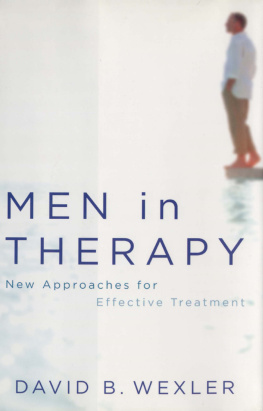
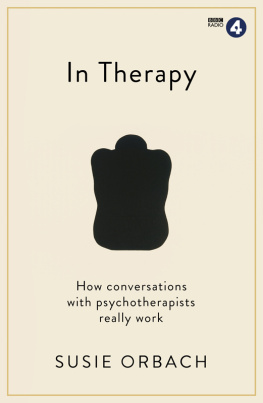
 TM The paper used in this publication meets the minimum requirements of American National Standard for Information Sciences Permanence of Paper for Printed Library Materials, ANSI/NISO Z39.48-1992.
TM The paper used in this publication meets the minimum requirements of American National Standard for Information Sciences Permanence of Paper for Printed Library Materials, ANSI/NISO Z39.48-1992.